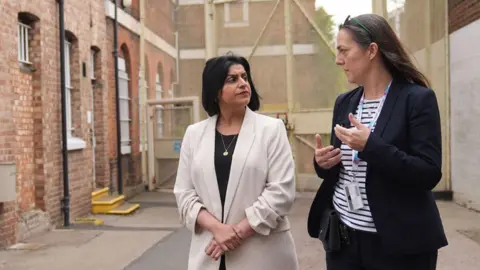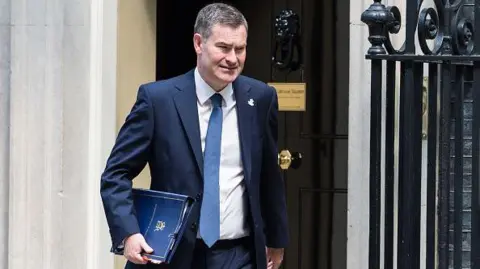ARTICLE AD BOX

 PA Media
PA Media
Justice Secretary Shabana Mahmood has said jails "are on the point of collapse"
Scrapping short prison terms is among a number of ideas set to be considered by an upcoming government review of sentencing.
Ministers are interested in proposals to toughen up community orders as an alternative to jail, to reduce the number of offenders in prisons.
David Gauke, a former justice secretary and Conservative MP, is the frontrunner to head the work, the BBC has been told by multiple sources.
The review will be announced later this month and is expected make recommendations to ministers next spring.
As justice secretary in 2019, Gauke said there was a strong case for scrapping jail terms of less than six months.
The BBC has approached Gauke for comment.
Shabana Mahmood, the current justice secretary, is known to want to toughen community sentences, which could involve strict conditions and punishments but no time behind bars.
Several government sources pointed to advances in technology, such as sobriety tags monitoring alcohol use, that could be used more widely to detain criminals in their homes.
One source argued community orders could be tougher than prison because those convicted could not “mong out for 23 hours a day on drugs”.
Ministers are also exploring international examples of reducing crime in Texas and Louisiana, where prisoners can reduce their sentences by earning credits for good behaviour.
Officials also pointed to New York, where offenders convicted of drug-related crimes can be sent on a treatment programme. If they complete it, they can have their charges dismissed or reduced.
It comes as prisons across the country are struggling to deal with overcrowding after the number of offenders behind bars hit a record high.
The Labour government has been exploring options to relieve the immediate pressure on prisons, and has already released some offenders early to free up space.
But further emergency measures to stop prisons breaching capacity will be needed next year, sources have told the BBC.
Ministers had hoped the existing early release scheme would buy them 12 months.
But the riots this year mean prisons are expected to be full again next summer, before any changes to sentencing can be made.
In the long term, ministers want to consider sentencing changes that could reduce crime.
Ending or moving away from short sentences could have a particular effect on the number of women in jail, after the Prison Reform Trust found last year that over half (58%) of jail terms given to women in 2022 were for less than six months.
Ministry of Justice figures show more than half of adults (57%) released from prison sentences of less than 12 months went on to reoffend.
One Ministry of Justice source said the government would be encouraging the reviewer “to follow the evidence in terms of how sentencing can cut crime”.
“Prisons are creating better criminals, not better citizens,” the source said.
A solicitor who was seen as being on the centrist wing of the Conservative Party, Gauke could be viewed as a contentious choice to lead the review.
In 2019, he made a series of speeches to call for a shift away from short prison sentences and towards punishment in the community.
But Gauke’s successor, Robert Buckland, said he did not believe abolishing short sentences was the right way forward.

 Getty
Getty
David Gauke talked about reforming sentencing when he was justice secretary
Lord Woolf, a former chief justice of England and Wales, told the BBC he thought Gauke would be a “very good person” to lead the sentencing review.
He said the government should consider launching a public inquiry into the penal system.
“I think there is ignorance over what prisons can achieve,” he said.
He wrote a report about the Strangeways prison riot in 1990 and has consistenly highlighted the problems of prison overcrowding since then.
The retired barrister was one of five former lord chief justices who signed a paper that blamed “sentence inflation” for the lack of space in prisons.
“The public want longer and longer sentences,” Lord Woolf said. “But they don’t know that’s self-defeating and it’s a very expensive policy.”
Tory leadership contender Kemi Badenoch criticised Labour for "taking short-term decisions and putting the public at risk", adding she wanted to tackle the "root causes" of prison overcrowding.
Robert Jenrick, the other remaining candidate in the leadership contest, said Labour was showing a "soft-on-crime approach", and repeat offenders needed "massively tougher sentences" to protect the public.
Other previous justice secretaries - including Ken Clarke - have talked up changes to sentencing, only to be stymied by political opposition or the electoral calendar.
The previous Conservative government’s attempt to bring in “a presumption that custodial sentences of 12 months or less be suspended” was dropped after the general election was called earlier this year.
Speaking at Labour’s conference last month, Lord Timpson, the prisons minister, said community sentences need “to be trusted more by the courts” as an alternative to jail.
He suggested previous prisons ministers had not always followed the evidence on “the best way to stop reoffending”.
The government has not made any decisions on potential changes to sentencing policy and will not do so until it has considered the recommendations of the review.
A Ministry of Justice spokesperson said: “The lord chancellor has confirmed plans to launch a review into sentencing that will focus on protecting the public and reducing reoffending.
“We will soon be in a position to announce the terms of reference for this independent review and confirm its chair.”

 5 months ago
30
5 months ago
30








 English (US) ·
English (US) ·